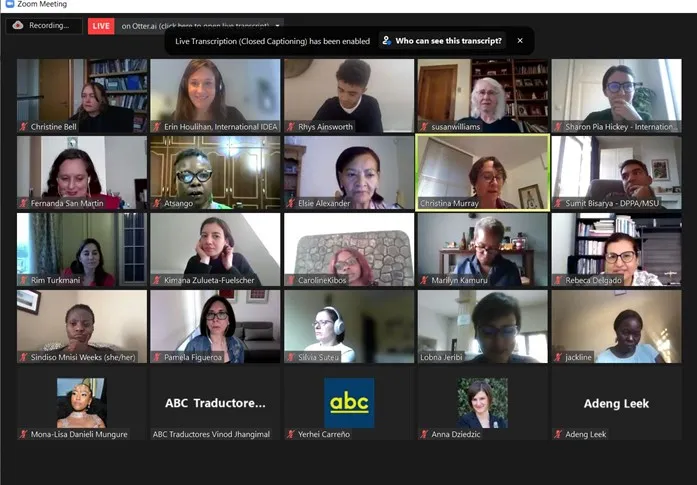Constitutions, Customary and Religious Law and Gender Equality: the 3rd annual Women Constitution-Makers’ Dialogue

The way that a constitution frames the relationship between the state, customary and/or religious law systems, and guarantees of gender equality is vital for the legal, economic, social and political status of women and girls. Many customary (and religious) systems include rules, procedures and institutions that discriminate against women and girls or violate their human rights. Common areas of tension relate to personal status matters, inheritance and control of property, and women’s bodily integrity. Customary and religious institutions often exclude women from positions of power which exert influence over women’s lives; traditional dispute resolution systems sometimes also involve practices that are discriminatory or harmful to women and girls. These structures and practices can even be formalized in constitutional frameworks.
Though there is wide variation across customary and religious law systems, they are often viewed as intertwined with cultural identity and self-determination. In many peace-building and constitutional reform processes, the recognition and protection of cultural rights, including customary and/or religious law, is essential to addressing past injustices, forging a political settlement and building broad societal consensus around a revised constitutional order to which religious and customary actors may be key.
Recognition is particularly relevant in situations where constitutional reform is rooted in issues of identity and demands for self-governance, or where the process aims to (re)found or (re)legitimize a political community after a period of exclusionary constitutional governance. Among Indigenous and other traditional peoples in particular, constitutional recognition of culture and custom is foundational to protecting traditional knowledge and to the exercise of rights to (internal) self-determination. The issue is increasingly important in several countries in Latin America, Africa and Asia and the Pacific, but is relevant in all regions of the world.
For women peacebuilders and constitution-makers, the balancing act between cultural and religious rights and gender equality is often complex and involves intersecting identities and interests. Moreover, the process of forging consensus among women, among political decision-makers and within society more broadly can be challenging. Both gender equality provisions and those on customary and/or religious rights serve multiple purposes and are important for a range of legal, normative and practical reasons. Given this, how should women constitution-makers and their allies approach reconciling these rights within a constitutional framework? How can they mobilize to influence negotiations on constitutional design to ensure that the constitution reflects an intersectional approach to women’s human rights? What constitutional design approaches and institutions may be the most optimal in a given context to enhance women’s substantive equality? How can women be more empowered to transform discriminatory elements of state institutions and customary/religious systems themselves?
The 2021 Women Constitution-Makers’ Dialogue focused on these issues to examine comparative experiences with constitutions, customary and religious law, and gender equality. The two-day online event included around 30 participants from diverse backgrounds and experiences. These included experts from Bolivia, Botswana, Chile, Kenya, South Africa, South Sudan, Syria, and Tunisia, along with senior international advisors and academics in the fields of constitution-building, peace processes, and gender and democracy. The closed event was held on 18 and 19 November by the Constitution-Building Programme of International IDEA in partnership with the Peace and Conflict Resolution Evidence Platform (PeaceRep) (involving researchers from the former Political Settlements Research Programme) at the University of Edinburgh Law School.
The agenda was organized into five sessions, including panelist presentations and open discussions. The first session focused on conceptualizing the theme of the event, framing the issues, and exploring trends in constitutional design and legal and policy approaches globally. The second session examined the ways in which demands for cultural and religious rights and gender equality arise in the constitution-making process and how intersecting identities shape coalition building amongst women. The third session focused on comparative constitutional design approaches to legal pluralism and reconciling tensions between customary/religious systems and guarantees of gender equality and non-discrimination. Next, participants examined successes and challenges with implementing the constitutional balancing act and the extent to which constitutional frameworks and institutions have been able to transform the discriminatory aspects of custom or religion to further empower women. The final session was an open discussion on reimagining the constitutional architecture and identifying innovative approaches to harmonization, transformation, and empowerment.
Overall, participants emphasized that the issue of discrimination in customary and religious conventions is a global problem that precedes state-based constitutions. Yet constitutions have an important role to play in transforming deeply held societal beliefs, attitudes and behaviors that contribute to the systemic marginalization of women in different contexts around the world. Key to this is recognizing that customary law – and to some extent religious law – are living systems, and that their ability to change over time is foundational to transformation. It is also crucial, among other points, to ensure that all law--including the constitution, legislation and traditional/religious systems--are demystified and accessible for everyone, and that advocates, traditional and ‘formal’/civil leaders and institutions are empowered and capacitated to support necessary change over time. As one participant noted, “Law is man-made, but can be woman-infused’.
The 2021 dialogue was the third in an annual Women Constitution-Makers series that was initiated in 2019 by International IDEA and PeaceRep. Publications on the outcomes for this latest event are forthcoming in 2022. The dialogue series aims to foster a global network of women constitution-makers and peacebuilders centered on peer-to-peer exchanges and comparative experience sharing. It aims to elevate women’s voices and roles in constitution-building globally, and to broaden understanding among the international community of women’s experiences, interests and needs.
Read about the 2nd annual Women Constitution-Makers Dialogue held in 2020 Constitution-Building in Response to Social Crisis: the Second Women Constitution-Makers Dialogue




